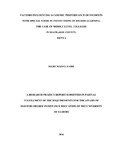| dc.description.abstract | Students with disabilities face diverse challenges in institutions of higher learning
which greatly affect their access and full participation in academic programmes. The
purpose of this study therefore is to find out factors influencing the academic
performance of students with special needs in middle level colleges in Machakos
County. The study was guided by the following four objectives: To establish how
family background influences the academic performance of students with special
needs, to establish how attitudes of students with special needs influence their
academic performance, to investigate how infrastructural facilities influence the
academic performance of students with special needs and to determine how
instructional strategies influence the academic performance of student with special
needs in middle level colleges in Machakos County. The study adopted Albert
Bandura‟s Social Cognitive Theory which emphasizes on the importance of self
efficacy as critical elements in human behavior and motivation and Equivalency
theory by Simonson which states that distance education programmes can be designed
to provide appropriate learning experiences for each student based on their unique
needs. Survey research design was used to gather data from the two inclusive middle
level colleges. The sampled population of the study included 79 students with special
needs and 72 tutors from the two institutions, a total of 151 respondents. Purposive
sampling was used to select the two public middle level colleges that admit students
with various special educational needs. Purposive sampling was also used to select all
the students with special needs from the two institutions as well as their tutors. The
research instruments used for collecting data were mainly questionnaires. For the
purpose of this study, three sets of questionnaires were prepared, questionnaires for
the sighted students, brailed questionnaires for the visually impaired students and
questionnaires for the tutors. The questionnaires were piloted by the use of split-half
method. Collected data was analyzed using the Statistical Package for Social Sciences
(SPSS) version2.0 and reported in form of frequency tables and percentages.
Regression analysis was carried out to test the hypotheses. The findings indicated that
family background, adapted classrooms and extra notes and hand-outs influence the
academic performance of students with special needs in middle level colleges in
Machakos County. The study recommends that the various legislations enacted such
as the Persons with Disabilities Amendment Bill (2007) be enforced in all learning
institutions. It was also recommended that distance education as a flexible mode of
study be utilized as one way of addressing the specific and unique educational needs
of students with disabilities so as to improve accessibility. Lecturers and support staff
be given mandatory basic training on disability training and that library contents be
availed in electronic formats as well as braille. The findings will be useful in institutes
of higher learning to assist in creating a disability friendly learning and physical
environment as well as helping to create confidence as well as a can-do attitude in the
students with special needs. This will lead to more students with disabilities enrolling
and excelling in higher education. | en_US |



